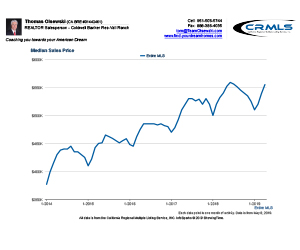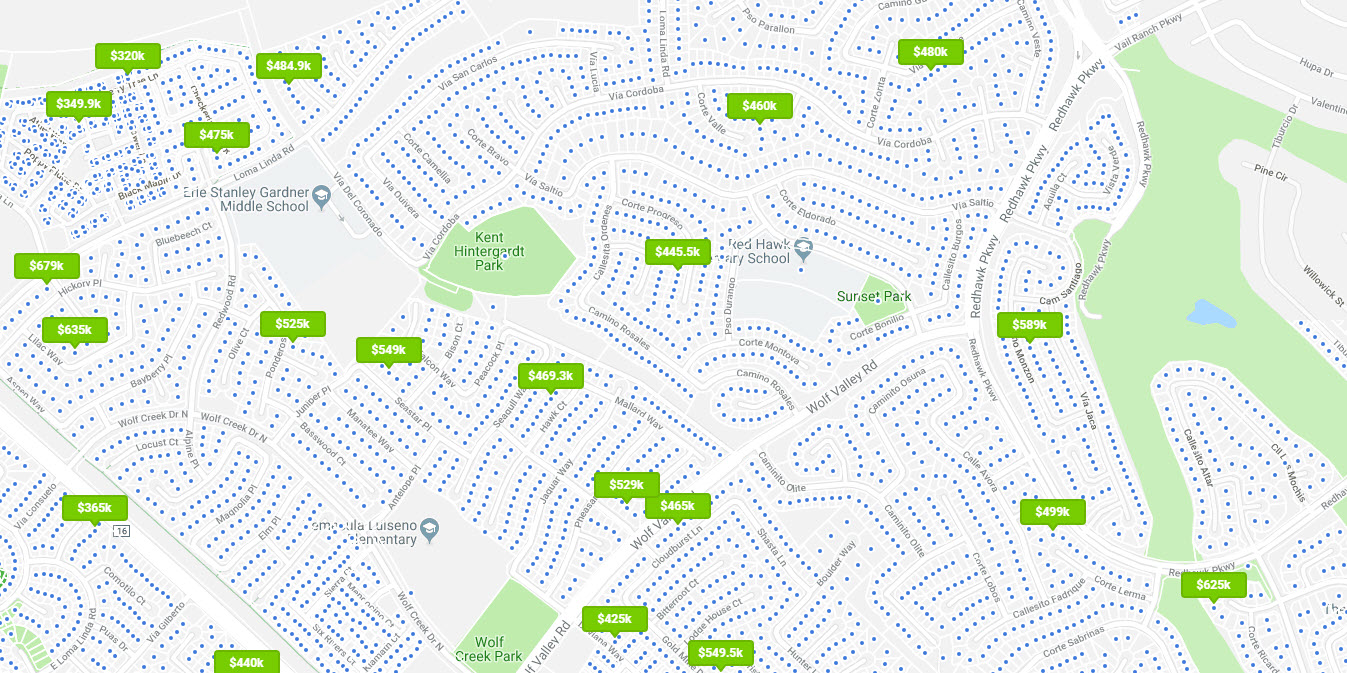So last week the stock market had an adjustment. So it probably had an effect on your portfolio of stocks but what if any effect will it have on the Real Estate Market. Should I sell?, Should I buy? Should I run? The quick easy answer as the experts see it there is no immediate need to worry! Definitely no need to worry! For now……..
So lets look at the details behind what the experts are saying. One of the things we’re going to talk about right from the beginning here is the very good possibility we’re going to have a recession in the next 18 months. Now, I know we’ve talked about that in a few of the – last couple of Team Olsewski Market Updates. But we have to realize with the Democratic debates starting, with the economy doing as well as it is, with there being question marks about whether the economy will still do well – for example, the Fed just lowered the interest rate again because there were some concerns in their mind. I think we’re going to see more and more or hear more and more talk about, “Is the economy faltering?” And I think that that word “recession” is going to keep on coming up. So, If you have been thinking about buying or selling in the Temecula Valley I want you to be prepared for it. Now, the main reason that there will be a lot of talk about it is there have been four major surveys so far this year, one by the Wall Street Journal, one by Duke University, one by the National Association of Business Economists, and one by the Pulsenomics, who surveys a little over 100 market analysts.
And they each asked a question in their survey: “When will the next U.S. recession begin?” Here is a graph of the results of all four surveys. So, you have a feeling for what each survey said. Now, to make it simple, what we did is we took all four years- all four time elements- and we combined all the people who thought it at that point in time and divided by four. Meaning, here’s really the combined number of each year as a percentage of all respondents to all four surveys. So, 21 percent believe that we’re going to have a recession sometimes before this year is over.
Another 46 percent believe that we’re going to have a recession sometime next year. And then, it goes on to 2021 and after 2021. So, the reason we’re giving you this right now is we have to see that 67 percent, two out of three of all the people surveyed in all four of those surveys, said that we’re going to come across a recession between now and the end of next year. And let’s not forget what next year is. It’s a presidential election year, probably the most contested presidential election in our nation’s history. So, there’s going to be a lot of debate, a lot of animosity being served up by both sides. And there’s going to be a lot of questioning over the economy. “Why is it good, and is it about to come apart?” That’s going to be part of the political rhetoric over the next year or so. So will this be a repeat of 2008? Not Really, But I want to point out two different quotes from last year when they did a study and looked back on 2008. On the ten-year anniversary of the crash of 2008, they looked back at it, and they said, “What were the major challenges that happened in 2008 to cause the whole economy to crash, the worldwide economy to come to its knees?”
First of all, Ben Bernanke, last year: “My results do suggest that, in the absence of the panic, the declines in employment, consumption and output at the early stages of the Great Recession would have been significantly less severe.” So, Ben Bernanke is saying, “If people didn’t panic, 2008 would have been nowhere near as bad as it actually wound up being.” And the second quote I have is from Warren Buffett, in a 2018 Wall Street Journal interview, again, looking back at 2008, ten years later. And his quote is: “Fear spread like a tsunami in 2008.”
So, what are we saying? Well, the word “recession” is going to come up. People are going to think about what happened in 2008 and equate it to now. And that’s going to cause a panic if we let that happen. And that panic, again – it won’t be as bad as 2008. But it’ll be worse than it needs to be if we don’t control the panic. So, we want you to be right on top of that. Remember, recession does not equal housing crisis. And that’s not me just saying that. Let’s go to the Miriam Webster Dictionary and look up the definition of the word “recession”: “A period of temporary economic decline during which trade and industrial activity are reduced, generally identified by fall in GDP in two successive quarters.” Now, why are so many experts predicting that we’ll have recession in the next 18 months? Well, ladies and gentlemen, let’s take a look. We’re now in the longest recovery in American history.
So, of course there’s going to be a slowdown coming. Slow downs are just part of the unites states economic cycles that have been happening for decades. Of course, we’re not going to be able to keep on going with this recovery forever. So, they do believe there’s going to be a slowdown. And that’s all that means is…… that GDP will slow down. However, do not equate the word “recession” to housing crisis and think that we’re going to have the same results of what happened in 2008. But I’ve shown you this graph several times now over the last couple of months. This chart will show you that in the last recession prices drops 19.7 percent. But, if we look at the four previous recessions, three of the four times, prices went up, two of those three times, they went up almost double the normal historical average, and the other time that it dropped, prices dropped, they dropped by less than two percent. This is so very important to understand!
So, the fear that 2008 is going to happen all over again because the word recession is applied – we can show you that that’s not the case. Now, remember, we talked about four surveys. The most current survey, which was just done a couple of weeks ago, was the Pulsenomics Survey of Analysts. And they asked them, “When will the next U.S. recession begin?” And on that, just that one survey, 59 percent, nine percent in 2019, 50 percent in 2020, said that it’s going to happen in the next 18 months. So, what we’re looking at is 59 percent said, “Yes, the recession’s coming.” But what wasn’t reported in the news is that same day on that same survey to those same exact analysts, they asked other questions. One question was, “What was going to trigger the next recession?”
And here are top three answers. The top three triggers, according to that same exact survey that projected a recession was coming – this is what they said. Number one trigger is probably going to be trade policy (we have been dealing with China Tariffs). Number two, there could be a stock market correction (This is what happened last week). And number three, geopolitical crisis. When they looked for a housing slowdown, because that did come up – some people did pick that – It was all the way down at number nine. So, there were eight things that were going to happen that were going to trigger the recession before they even got to a housing slowdown. So, again, in 2008, the housing slowdown, the situation in the mortgage industry, caused that recession. This year, Real Estate is not even in the top eight reasons that a recession might take place.
Again, those same people, that same day, on that same survey also projected where prices are going to be over the next five years.
And, as we can see, they think, this year, they’re going to finish up with a 4.1 percent appreciation. That appreciation is going to slow up over the next two years. And then, it’s going to come back and recover to normal historical appreciations, which is somewhere between 3.5 and four percent on an annual basis. The most important thing is the same people that projected the recession was coming also said prices are not going to depreciate. Appreciation is going to decelerate, but prices are still going to go up. So, the crash that we saw in 2008 – the people actually predicting the recession are saying we’re not going to see that again. All we’re going to see is a slowdown in the amount or the percentage that homes are going up, not that they’re going to depreciate. And Morgan Housel, a well-renowned financial analyst – I like what he said: “An interesting thing is the widespread assumption that the next recession will be as bad as 2008. Natural to think that way, but, statistically, highly unlikely. Could be over before you realized it began.”
Let’s hope he’s right. Let’s hope, unlike 2008, where the plane crashed, this time the pilot can bring it down and land and have such a soft landing we don’t even feel the wheels hit the ground. If we look at the homeownership rate in the third quarter of 2018 and the fourth quarter of 2018, the numbers went up. Then, last year, at the end of last year, when interest rates went up and people started worrying about it, that percentage of homeownership dropped slightly.
Now, again, there’s no challenge overall because, if we go all the way back to 1996, we can see that it shot up, going into the big boom. Then it fell like a rock after that, and it’s been recovering the last couple of years. So, this minor blip, this minor decrease isn’t anything to worry about unless you understand the details, as we always say, concern causes fear, fear can cause paralysis. With detail information about the situation my goal is to take the fear away by handling your concerns. And we have to do that as far as talk of recession taking place. The other thing that we want to discuss the month is affordability because there was a recent survey done by CoreLogic that showed that affordability in people’s minds was the leading obstacle to homeownership.
It’s no longer down payment. It’s no longer all those other things. The number one obstacle to homeownership by the survey was affordability. And that number jumped dramatically from 2018 to 2019. It went from a little over 30 percent all the way up to 40 percent. And it’s – again, the number one obstacle in buyers’ minds. Now, I get it that people are talking about affordability. I get it that people are saying, “Well, affordability is not where it was ten years ago.” But we have to remember ten years ago, interest rates, right after the housing bust, dropped to all-time lows and prices dropped dramatically. So, very obviously affordability then was better than it is now. If we take a look at affordability going all the way back to when National Association of Realtors first started recording it, we can see that, if we go all the way back to 1990 and we look at today’s affordability – and, by the way, with this graph – the higher the graph, the more affordable homes are.
The higher the
graph, the more affordable homes are. We can see that today’s Affordability Index is nowhere near
where it was the years when distressed properties dominated the market, the red
bars.
But, if we go before that, if we go to 2007, 2008, all the way back to 1990, it’s more affordable today to buy a home than it was in the 1990s and all through the 2000s, right up until the crash. So, yes, it’s not as affordable as when the houses were cheapest, in some ways, in American history. But it is more affordable than the normal markets that preceded the boom and the crash. And I think it’s important that you understand that. As a matter of fact, CoreLogic came out with their Typical Mortgage Payment.
And they said – the typical mortgage payment, adjusted for inflation, that buyers commit to now – and they take a look at it from January 2000. They look at it in June 2006, at the height of the boom. They look at it in February 2012 at the bottom of the crash. And what has been since then and what they projected to be March of 2020. And what we can see is the typical mortgage payment, though above where it was in February 2012, at the bottom of the crash, is better, not only than what it was during the height of the boom, but it was better than what it was prior to the boom in January 2000. Adjusted for inflation, today’s typical mortgage payment is less than it was then. And what is projected to be this time next year or March of next year is still lower than what it was in January of 2000.
And part of the reason for that is wages are going up, and interest rates, though not where they were in 2012, are still lower. So, another thing that the National Association of Realtors does, is they list every month, the payment, typical mortgage payment as a percentage of income. And we can see that, since June of last year, for the last 12 months, it has been falling, and now, it’s jumping somewhere between 16 and 16 3/4 percent. But, a drop from 18.2 percent. But, probably the best thing about that, historically, before the boom and the bust and what’s happened since, historically, the percentage of your income that goes to a house, a mortgage payment, was 21.2 percent.
So, that 16.6 percent today – we’re much lower than what the historic norm was. And we have to make sure that people understand that, because all they’re looking at is that prices continue to go up. And they’re saying, “Well, if prices are going up, then it’s got to be less affordable.” Well, no. As Mark Fleming, First American’s Chief Economist explained: “When demand increases for a scarce (limited or low supply) good, prices will rise faster. The difference between houses and other goods is that we buy them with a mortgage”-We buy homes with a mortgage– “So, it’s not the actual price that matters, but the price relative to the purchasing power.” Meaning, when we put in wages, when we put in the mortgage rate and we put in the price, what percentage of the amount of money you make goes to your mortgage payment? And, as we have just shown you, that number has dropped dramatically and is much lower than the historic norm, and the reason for that is that 30-year fixed rate mortgage rate has dropped almost a full point in the last eight months from 4.75 percent to 3.75 percent.
And going
back to Mark Fleming, the Chief Economist
at First American, here’s an
interesting tidbit: “If the 30-year,
fixed-rate mortgage declines just a fraction more” – and some people are
projecting that to happen – “consumer
house-buying power could reach its highest level in almost 20 years.” So,
not only is affordability not a challenge – now, there are certain markets
where prices are way up, and I understand that. But we’re talking about overall
in the country. Not only is affordability not a challenge, it might be the best
it’s been in 20 years if the interest rates just drop a
little bit more. And that’s big. So, when we’re talking about everything here, please make sure that you understand a recession may well be on its way but it should not have an effect on home values and that homes are extremely affordable at this point in time.
If anyone is interested I can provide all of the details on the sources for this information as these people are a lot smarter then me with regards to the economy. So the bottom line as I see it from the experts there is no need to panic with regards to the real estate market. Its still a good time to upsize or downsize, or buy that first home as the affordability is great, and home values are expected to increase over the next couple of years!
This is Tom Olsewski with Team Olsewski and Coldwell Banker signing out……………Make it a great day!








